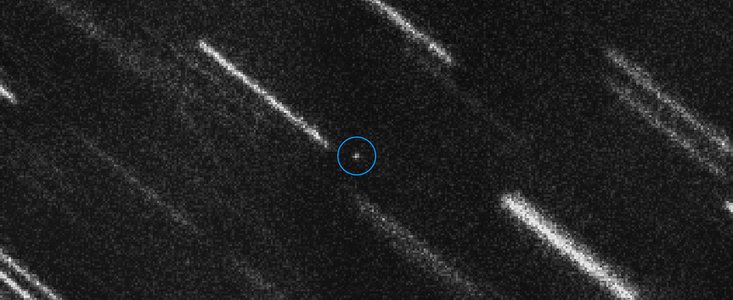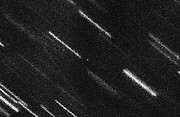Annuncio
Un incontro molto ravvicinato
10 Agosto 2017
Nell’ottobre del 2012, l’asteroide near-Earth 2012 TC4 ha avuto un incontro ravvicinato con il nostro pianeta. È passato a una distanza che corrisponde a solo un quarto di quella tra la Terra e la Luna. Nell’ottobre del 2017, questo piccolo asteroide, che misura solo tra i 15 e i 30 metri, ritornerà per un altro passaggio molto ravvicinato, il che lo rende l’oggetto perfetto per testare la rete di rilevazione e monitoraggio degli asteroidi.
Dato che 2012 TC4 non era stato visibile per molti anni, la sua orbita non era molto conosciuta. In particolare, gli astronomi non potevano prevedere quanto vicino sarebbe stato alla Terra durante il suo prossimo passaggio ravvicinato nel 2017. Dunque, trovarlo di nuovo e osservarlo nel dettaglio era fondamentale per capire quanto si sarebbe avvicinato al nostro Pianeta e per migliorare la nostra conoscenza della sua orbita.
Dato che l’asteroide è così piccolo e ancora molto distante, è molto debole e dunque difficile da individuare. Tuttavia, usando il VLT (Very Large Telescope) dell'ESO, gli astronomi hanno potuto ottenere questa immagine del nostro futuro visitatore per la prima volta in molti anni e calcolare la sua traiettoria. Questa nuova osservazione indica che passerà a una distanza dalla Terra di circa 44 000 km, corrispondenti a 6,85 raggi terrestri, il 12 ottobre 2017.
Il VLT dell’ESO non è l’unico telescopio che sta osservando 2012 TC4. Si sta svolgendo un’importante campagna di osservazione internazionale per identificare e studiare questo oggetto, sfruttando questo incontro ravvicinato. Ora che il VLT ha ritrovato 2012 TC4, è disponibile una nuova orbita aggiornata. Vari telescopi di tutto il mondo sono ora in grado di localizzare l’asteroide e presto inizieranno a osservarlo, sfruttando questa rara opportunità di studiare un asteroide in maniera così dettagliata.
Contatti
Richard Hook
ESO Public Information Officer
Garching bei München, Germany
Tel: +49 89 3200 6655
Cell: +49 151 1537 3591
Email: rhook@eso.org
Riguardo all'annuncio
| Identificazione: | ann17052 |


